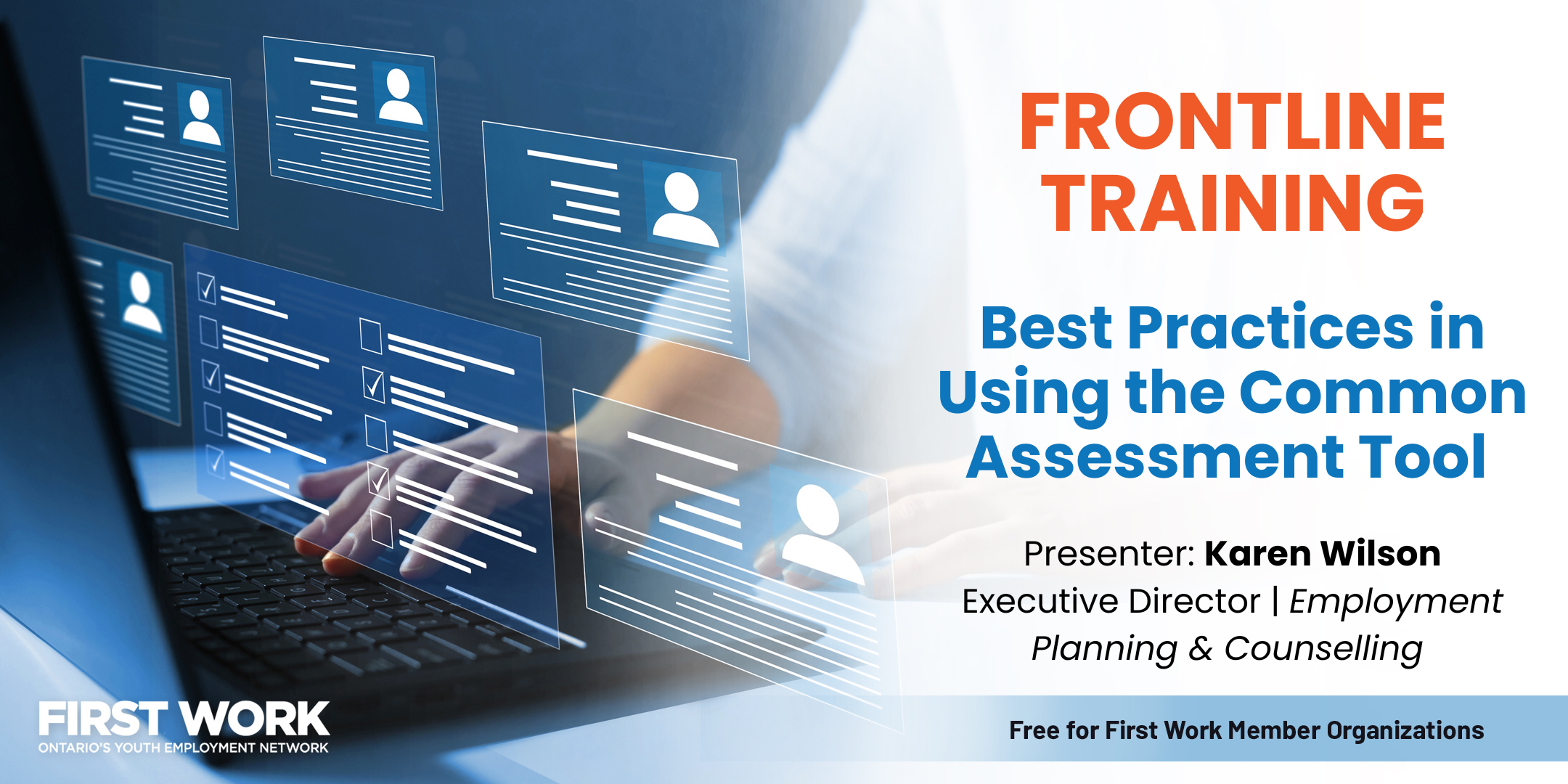Following active participation and input from First Work’s Regional Frontline Meeting participants, we’re excited to share the following training opportunities for members only!
Registration is open for First Work members via the member’s update or on the Member’s portal.
- Trauma Informed Care & Practice
- Practical Application of Motivational Interviewing
- Best Practices in Using the Common Assessment Tool
- Understanding Client Barriers and Designing Job Retention Strategies for Success
- Cyber Security
This webinar series is exclusively available to First Work frontline members on a first-come, first serve basis. Due to high demand and limited capacity, registration is limited to 2 people per organization. Please notify First Work if you are no longer able to participate.
Should more than 2 attendees from the same organization wish to attend, they can still register to be added to the waitlist in the event that seats open up.
If you have any questions, please do not hesitate to reach out to [email protected]

Practical Applications of Motivational Interviewing
Motivational Interviewing is an evidence-based counselling approach working with individuals contemplating a change. This hands-on, client-centred yet worker-directed approach will be described and applied. This interactive session will engage participants to apply the concepts in practice and opportunity to reflect in small and large group discussions.
Presenter: Dale Kuehl | Advanced Practice Clinical Leader
Do you struggle to understand a client’s motivation or lack thereof? Have you found yourself more invested in the goal than the client? Do you want to understand the concepts of ambivalence, readiness and strategies to avoid the Righting Reflex? Motivational Interviewing is a client-centered, evidence-based counselling approach to working with clients ambivalent about making a change. Since its development in the 1990s, it has been successfully applied in education, employment, healthcare, social service settings.
By the end of the session participants will be able to:
- Define motivational interviewing
- Understand key concepts: ambivalence, readiness, change talk, sustain talk
- Building motivation to change and goal setting
- Apply the tools and strategies through roleplays, case studies, small & large group discussions
*Attendees will receive a certificate of completion for their active participation. Please note this session will not be recorded.
Please note: Although attending part 1 and part 2 is not a pre-requisite to attending part 3, it is highly recommended.
Registration is open for First Work members via the member’s update or on the Member’s portal.

Trauma Informed Care and Practice
Implementing trauma-informed care into our service delivery means understanding the impacts of trauma on the individual – that trauma is a defining and organizing experience that forms in the core of an individual’s identity with far reaching impact which can often lead to one facing additional barriers in reaching their life goals(Harris & Fallot, 2001). By incorporating this approach, we can better help individuals understand that recovery is possible - in order to allow them to flourish and reach their full potential.
Presenter: Theresa Hirschberg | Founder of Sights on Solutions
The learning of trauma-informed practices itself requires a safe and open environment where participants can explore exercises which invite them to connect with their own feelings of vulnerability. Join mental health and substance abuse expert Theresa Hirschberg – with 30+ years of experience working with clients in crisis – to further learn and implement trauma informed care and practices. This space will provide an introductory understanding of the principles of trauma-informed care and a deepened understanding of potential symptoms and outcomes of trauma. There will be opportunities to discuss and encourage self-care throughout the session.
Learning Outcomes:
- Deepen the participants' understanding of complex trauma and its potential outcomes
- Introduction to the window of tolerance
- Develop strategies to create psychological and physiological safety, best practices to work with clients whom have experienced trauma and managing triggers in the workplace
- Explore self-care strategies for professionals and cultivating self-compassion
*Attendees will receive a certificate of completion for their active participation. Please note this session will not be recorded.
Please note: Although attending part 1 and part 2 is not a pre-requisite to attending part 3, it is highly recommended.
Registration is open for First Work members via the member’s update or on the Member’s portal.

Understanding Clients Barriers and Designing Job Retention Strategies
With Ontario’s changing employment services system, there is a need to ensure clients facing multiple barriers are receiving the best support available.
Presenter: Karen Wilson | Executive Director of Employment Planning & Counselling
Understanding Clients Barriers and Designing Job Retention Strategies
This course was created to assist front line employment service workers in addressing job retention issues that exist with our highly barriered clients. We will review concepts and strategies that help to reframe and understand the behaviours of our clients, then discuss and develop strategies and best practices to support them in mitigating and overcoming those barriers for long term success at work.
The day will include a discussion of theories and best practices, interspersed with interactive, small-group activities for brainstorming and practice. This allows for not just learning from the facilitator, but from the experience of all who participate.
Learning Outcomes:
- Understanding of the key concepts of Bridges Out of Poverty and Trauma Informed Care
- With consideration to those concepts, identification and enhanced understanding of common client behaviours that inhibit success
- Knowledge of proven best practices for job retention and understanding of why they work
- Development of new tools and strategies for direct use with individual clients and groups
- Development of strategies to engage with and educate employers
Registration is open for First Work members via the member’s update or on the Member’s portal.

Best Practices in Using the Common Assessment Tool (CAt)
As Ontario’s employment services transformation continues, the Common Assessment tool (CAt) will soon be in use across the province. To ensure best practices in administration are shared, this course has been developed to build familiarity with this new intake tool.
Presenter: Karen Wilson | Executive Director of Employment Planning & Counselling
This course was created to create familiarity with the Common Assessment tool (CAt) as an early step in our work with new clients while incorporating client-centred philosophies while administering.
The day will include a discussion of theories and best practices, interspersed with interactive, small group activities for brainstorming and practice. This allows for not just learning from the facilitator, but from the experience and perspectives of all who participate.
Learning Outcomes:
- Increased familiarity with the Common Assessment tool
- Understanding of how streaming impacts client service
- Knowledge and understanding of the pitfalls of the CAt and streaming outcomes
- Development of tools and strategies to maintain a client-centred approach
Registration is open for First Work members via the member’s update or on the Member’s portal.

Cyber Security Training
Based on discussion and increasing reliance on digital solutions, First Work will be offering Cyber Security training for frontline staff. This training will initiate with an introductory overview of Cyber Security, taking place at our Regional Manager meetings.
Presenter: Everton Wilmot | President of Wilmot Technologies
Registration is open for First Work members via the member’s update or on the Member’s portal.
